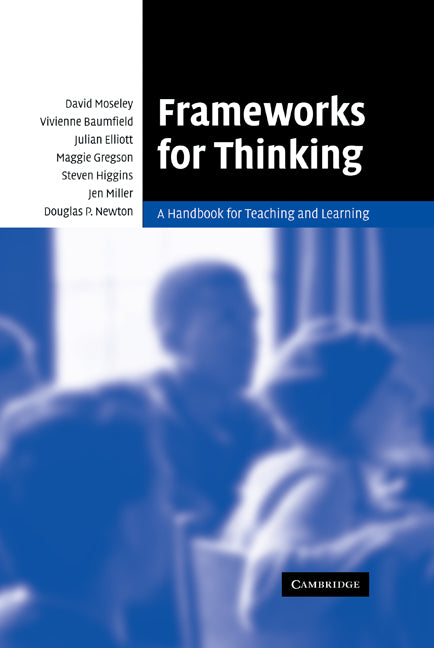Freshly Printed - allow 8 days lead
Couldn't load pickup availability
Frameworks for Thinking
A Handbook for Teaching and Learning
Provides descriptions and evaluations of 42 major frameworks for thinking with easy-to-grasp summary tables.
David Moseley (Author), Vivienne Baumfield (Author), Julian Elliott (Author), Steven Higgins (Author), Jen Miller (Author), Douglas P. Newton (Author), Maggie Gregson (Author)
9780521848312, Cambridge University Press
Hardback, published 1 December 2005
380 pages, 29 tables
22.9 x 15.2 x 2.5 cm, 0.73 kg
'For teachers, clinicians and psychotherapists … this book is a fabulous source of new knowledge that can only foster their critical thinking over how they teach and how they heal.' Canadian Academy of Child and Adolescent Psychiatry
This handbook focuses on the thinking processes necessary for learning. It provides descriptions and evaluations of 42 major frameworks including Bloom's taxonomy, de Bono's lateral and parallel thinking tools, Gardner's theory of multiple intelligences and Paul's model of critical thinking. Unique in its comprehensive coverage and interdisciplinary approach, it offers easy-to-grasp summary tables for each major theorist for speedy reference. The discussion of cognitive, emotional and social aspects of thinking and the nature of classification help the reader locate theories within a broader field of knowledge. Key concepts such as critical thinking, self-regulation and metacognition are examined from a range of perspectives. The handbook offers practical advice in the form of choices and recommendations for the use of frameworks in teaching, learning and assessment. A valuable tool for students needing to understand different ways of thinking it will also be an essential resource for teachers, curriculum developers, researchers and policy-makers.
Introduction
1. The nature of thinking and thinking skills
2. Lists, inventories, groups, taxonomies and frameworks
3. Frameworks dealing with instructional design
4. Frameworks dealing with productive thinking
5. Frameworks dealing with cognitive structure and/or development
6. Seven 'all-embracing' frameworks
7. Moving from understanding to productive thinking: implications for practice.
Subject Areas: Educational psychology [JNC], Cognition & cognitive psychology [JMR]


